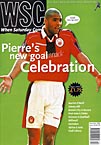 Recent spats at the New Den have put the club's fans back under the microscope, but Lance Bellers explains why things are different this time around
Recent spats at the New Den have put the club's fans back under the microscope, but Lance Bellers explains why things are different this time around
Hooliganism would appear to be back at Millwall. Recently we have had Man City players supposedly “too frightened to go for a winner”, City fans kept in for an hour after the final whistle for their own safety and Fulham players confronted on the pitch by home fans. Same old story in south-east London? Well, yes and no.
Yes, in that the two fixtures mentioned represent the major attractions of the season and, as always, bring out the less desirable elements to cause havoc. And no, in that the club now take steps like never before to quash this un-wanted behaviour. On the first page of the programme for the York City game (just a few days after the Fulham incident and a night when one third of the previous crowd showed up), you could read the following: “Ban For Thugs – The two idiots who came onto the pitch against Fulham have been identified [names were given] and both are due to appear in court this week. Bans have been imposed on them indefinitely, although one wonders whether they will be much bothered since one claimed to follow Spurs and the other West Ham.”
This is not to suggest that Millwall’s problems are caused by casual troublemakers. It merely underlines the fact that the club continues to be a focus for anyone with bad intentions and an evening to spare. For the Man City and Fulham fixtures, the sections of the ground that are normally almost deserted were suddenly brimming with mobs of young men, intent on hurling abuse at the away end.
There are some grounds in the Premiership and Football League where this might be described as contributing to “a terrific atmosphere”, but at Millwall it is usually interpreted as plain menacing. The City fixture was lively, to say the least, featuring a 20-player brawl, two sendings-off, two home goals disallowed and an injury-time equalizer for the visitors. The Fulham game was punctuated by another sending off, a referee seemingly intent on booking every single Millwall player and yet another late goal against the home team.
The special representative sent by the FA to monitor the Fulham fixture would have seen pitch invasions from the section mainly occupied by the twenty-somethings, but the transgressors at the City game were boys of no more than 14 years old, mostly booed by the home crowd, keenly aware of the damage that kind of pointless behaviour can cause.
Sitting in the upper tier of the South Stand, I have never felt personally threatened by all this and after the City game, for example, simply went back to my car and drove home, unaware of the violence that is reported to have taken place outside. It seems quite likely that you would only be involved if you really wanted to be – even the away fans are pretty safe at Millwall these days thanks to the expert policing.
However, other experiences are inescapable. This season has seen a re-emergence of monkey noises aimed at black players on the other team, usually coming from the teenage end of the crowd. To Millwall’s credit, they do actually eject and arrest people for this now, probably more so than most clubs in the country.
Unfortunately, attendance at the ground is still almost exclusively white, the New Den remaining too uncomfortable a venue for the large black population of Deptford and Bermondsey. Shaun Goater pointed out that even in his Bristol City days The Den was his least favourite away ground, a fact that should make Millwall supporters cringe.
To outsiders, the recent incidents must make Millwall seem like a relic from the past, a venue untouched by the shining light of the Premiership. This is true in the sense that the New Den, for better or worse, retains some of the elements of living, breathing football lost at clubs more concerned with marketing themselves. Yet at the same time the club have made enormous efforts to encourage young supporters and families to support their local team and to keep the lid on a sometimes explosive following. For that they deserve credit rather than blind condemnation.
From WSC 142 December 1998. What was happening this month